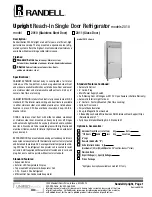
EN -12-
• Storing fruit and vegetables separately helps prevent ethylene-sensitive vegetables
(green leaves, broccoli, carrot, etc.) being affected by ethylene-releaser fruits (banana,
peach, apricot, fig etc.).
• Do not put wet vegetables into the refrigerator.
• Storage time for all food products depends on the initial quality of the food and an
uninterrupted refrigeration cycle before refrigerator storage.
• To avoid cross-contamination do not store meat products with fruit and vegetables.
Water leaking from meat may contaminate other products in the refrigerator. You should
package meat products and clean any leakages on the shelves.
• Do not put food in front of the air flow passage.
• Consume packaged foods before the recommended expiry date.
NOTE
: Most efficient use of energy is ensured in the configuration with the drawers in
the bottom part of the appliance, and shelves evenly distributed, position of door bins
does not affect energy consumption.
NOTE
: Potatoes, onions and garlic should not be stored in the refrigerator.
• For normal working conditions, it will be sufficient to adjust the temperature setting of
your refrigerator to +4 °C.
• The temperature of the fridge compartment should be in the range of 0-8 °C, fresh foods
below 0 °C are iced and rotted, bacterial load increases above 8 °C, and spoils.
• Do not put hot food in the refrigerator immediately, wait for the temperature to pass
outside. Hot foods increase the degree of your refrigerator and cause food poisoning
and unnecessary spoiling of the food.
• Meat, fish, etc. should be store in the chiller compartment of the food, and the vegetable
compartment is preferred for vegetables. (if available)
• To prevent cross contamination, meat products and fruit vegetables are not stored
together.
• Foods should be placed in the refrigerator in closed containers or covered to prevent
moisture and odors.
The table below is a quick guide to show you the most efficient way to store the major food
groups in your refrigerator compartment.
Food
Maximum storage time
How and where to store
Vegetables and fruits
1 week
Vegetable bin
Meat and fish
2 - 3 Days
Wrap in plastic foil, bags, or in a meat container
and store on the glass shelf
Fresh cheese
3 - 4 Days
On the designated door shelf
Butter and margarine
1 week
On the designated door shelf
Bottled products e.g. milk
and yoghurt
Until the expiry date
recommended by the
producer
On the designated door shelf
Eggs
1 month
On the designated egg shelf
Cooked food
2 Days
All shelves
Summary of Contents for RTF2121W
Page 63: ......













































